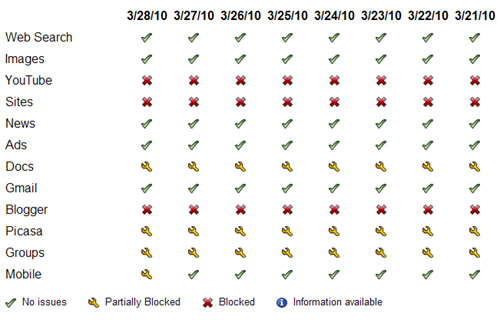Seven months from now, another confrontation between Google and the Chinese government may well occur. The government’s indicated that it intends to take legal action against Google if the company doesn’t seek (and obtain) official approval of its mapping program.
China issues mapping licenses in order to ensure that all maps match the government’s own view of its territory. That way, citizens aren’t encouraged to think that disputed regions might belong to other countries or be independent. Also, military facilities can better be kept out of public view.
Google hasn’t even applied for a mapping license, though, Michael Kan learned from the Chinese government.
So Kan was able to report, "China will investigate and prosecute Google next July if the search engine company does not acquire the necessary state license to operate its Google Maps service in the country, according to the government."
 That could become a major problem for Google, since being unable to provide such a basic service would probably affect its share of the search market.
That could become a major problem for Google, since being unable to provide such a basic service would probably affect its share of the search market.
Meanwhile, Kan wrote, "Domestic search engine Baidu, which holds a 73 percent market share, has already received approval for a mapping license. Microsoft’s joint venture in China is in the process of applying, the bureau said."

 Google lost a fair amount of ground to Baidu due to its dispute with the Chinese government and switcheroo involving servers in Hong Kong, so this makes sense if you figure that the company needs to compensate. It makes less sense if you think another clash is inevitable.
Google lost a fair amount of ground to Baidu due to its dispute with the Chinese government and switcheroo involving servers in Hong Kong, so this makes sense if you figure that the company needs to compensate. It makes less sense if you think another clash is inevitable.
 That’s in no way a good sign for Google.
That’s in no way a good sign for Google.  As explained by
As explained by 


 "We are pleased to help Japanese small businesses sell their products to China on our Taobao platform as we believe more choice is a good thing. As a result of this initiative, our respective customers will eventually be able to choose from millions of products from China and Japan," said Jack Ma, chairman and CEO of Alibaba Group.
"We are pleased to help Japanese small businesses sell their products to China on our Taobao platform as we believe more choice is a good thing. As a result of this initiative, our respective customers will eventually be able to choose from millions of products from China and Japan," said Jack Ma, chairman and CEO of Alibaba Group. 

 Locations can be deceiving. "When considering the true location of the sender rather than the location of the email server, fewer attacks are actually sent from North America than it would at first seem," says Paul Wood, Senior Analyst for Symantec’s MessageLabs Intelligence. "A large proportion of targeted attacks are sent from legitimate webmail accounts which are located in the US and therefore, the IP address of the sending mail server is not a useful indicator of the true origin of the attack. Analysis of the sender’s IP address, rather than the IP address of the email server reveals the true source of these targeted attacks."
Locations can be deceiving. "When considering the true location of the sender rather than the location of the email server, fewer attacks are actually sent from North America than it would at first seem," says Paul Wood, Senior Analyst for Symantec’s MessageLabs Intelligence. "A large proportion of targeted attacks are sent from legitimate webmail accounts which are located in the US and therefore, the IP address of the sending mail server is not a useful indicator of the true origin of the attack. Analysis of the sender’s IP address, rather than the IP address of the email server reveals the true source of these targeted attacks."